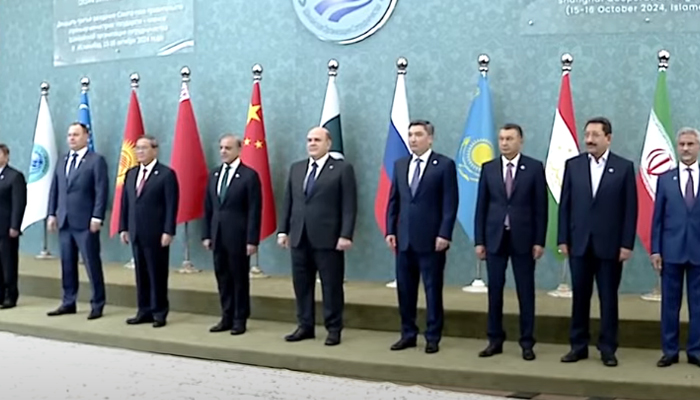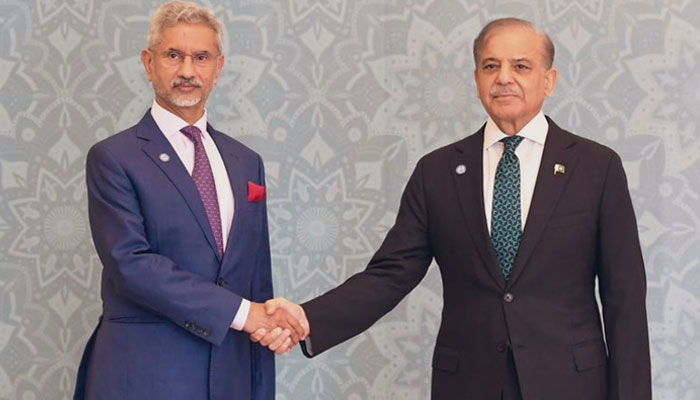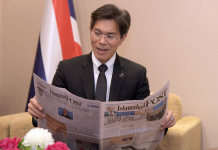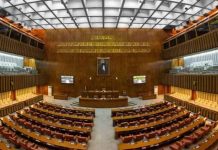ISLAMABAD: At the high-stakes Shanghai Cooperation Organisation (SCO) conference in Islamabad, Pakistan has urged member states to prioritise collective efforts for regional security and stability amid a rapidly changing global landscape.
“We are at a historic moment of transition where sweeping transformations are reshaping the global, social, political, economic, and security landscape,” he said in his keynote address at the 23rd meeting of the SCO Council of the Heads of Governments (CHG).
The SCO moot — the highest-profile event hosted by the country in years — is being held at the Jinnah Convention Centre in Islamabad, with leaders from 10 countries in attendance, including arch-rival India.
Indian Foreign Minister Subrahmanyam Jaishankar’s participation at the event is a major highlight, marking the first such visit by an Indian FM in almost a decade amid frosty relations between the two nuclear powers.
Commenting on the diplomatic reverberations of the SCO summit, former ambassador Maleeha Lodhi said that Islamabad had significantly bolstered its international standing.
“By holding this summit, Pakistan’s diplomatic position has strengthened globally. This is an important diplomatic moment for Pakistan as important leaders are attending the summit,” said Lodhi while speaking to Geo News.
PM champions regional peace, stability
Presiding over the meeting, PM Shehbaz said: “From the esteemed platform of the Shanghai Cooperation Organisation, a beacon of multilateralism, I stand in the belief that we possess not only the potential but the will to forge a future that is more prosperous and secure for our people.
“A future, that is inclusive, and reflective of the shared aspirations of all member states,” the premier said while addressing the meeting.

The premier said that Afghanistan, by virtue of its contiguity with the region, presents an invaluable opportunity for trade and transit, benefiting all SCO member states.
“A stable Afghanistan, is not only desirable, but essential, to fully realising these opportunities,” he added.
It may be noted that the neighbouring nation is part of the regional bloc. It holds the positon of an observer state but has been inactive since 2021, when the Taliban took over.
The premier called on the international community to step forward, with urgent humanitarian support for Afghanistan, while also urging its interim Taliban government to embrace political inclusivity to ensure that Afghan soil is not misused for terrorism against its neighbours by any entity.
PM Shehbaz highlighted the challenges of poverty in his address, saying that it was not just an economic issue but a moral imperative that demanded the collective attention of the regional states.
“With millions living in poverty within the SCO region, closer cooperation on poverty alleviation is critical,” he added.
PM Shehbaz underscored that Pakistan, as the permanent chair of the SCO Special Working Group on Poverty, has facilitated, several seminars, and webinars aimed at sharing of knowledge, and best practices.
He reaffirmed the country’s commitment to providing the required impetus to the collective efforts to address the root causes of poverty and uplift the quality of life for our people.
Speaking about another dire global issue, PM Shehbaz said that climate change is an existential crisis that transcends borders and its impacts are felt universally but more acutely by nations like Pakistan.
He went on to say that the country is on the frontline of climate-induced disasters.
“It is imperative that we prioritise environmental cooperation within the SCO to build resilience and secure a sustainable future for the generations to come,” the premier added.
Moreover, the prime minister maintained that Pakistan welcomes the recent SCO agreement on environmental protection and calls upon all member states to actively engage in both regional and global environmental efforts.
He said that the government has developed a “one of its kind” proactive, technology-driven, disaster management system.
“We look forward to organising, simulation exercises with SCO partners, to bolster, disaster preparedness, across the region,” PM Shehbaz added.
Emphasising the importance of connectivity, the premier urged the establishment of a robust SCO connectivity framework to boost regional trade and advance the vision of a connected Eurasia.
He also called for the expansion of flagship projects like the Belt and Road Initiative (BRI), the China-Pakistan Economic Corridor (CPEC), and the International, North-South Transport Corridor (INSTC) to enhance integration and cooperation, across the region.
“Let us not look at such projects, through the narrow, political prism and invest in our collective connectivity capacities, which are crucial to advancing the shared vision of an economically integrated region. Let us work together for a well-integrated and prosperous region that benefits all Member states,” he added.
Moreover, the premier stressed that unilateral coercive measures and protectionist policies run contrary to the principles of international law as they “stifle economic growth, hinder, technological advancements and exacerbate inequality”.
PM Shehbaz Sharif called on the SCO leaders to encourage private sectors in their respective countries to cultivate an environment that is conducive to business and investment within the region.
He said that the growing consensus, among member states on the use of mutual currencies for settlements is a promising development.
The premier added that Pakistan firmly believes that a stronger and more effective SCO is essential to achieving sustainable development in our region.
“We wholeheartedly endorse, the ongoing reforms, aimed at modernising the organisation, enhancing the resources and capabilities of the SCO Secretariat and the Regional Anti-Terrorist Structure,” he said.
PM Shehbaz reminded the SCO member states that the “true essence” of the multi-lateral forum extends, beyond political alliances and economic partnerships.
“Pakistan remains deeply committed to fostering people-to-people ties and cultural exchanges that bridge divides, cultivate understanding, and deepen cooperation. In unity and with shared purpose, we can build, lasting legacies, and enrich, the future, of all our nations,” PM Shehbaz said while concluding his keynote address.
Before the meeting officially kicked off, the premier welcomed the leaders at the venue, which was followed by a group photo.
FM Jaishankar calls for self-accountability for ‘lack of trust’
Speaking on the occasion, Indian FM Subrahmanyam Jaishankar felicitated Islamabad on assuming the SCO chairmanship and said that New Delhi’s full support to make its presidency successful.
Underscoring the need to have an honest discussion, Jaishankar called for self-accountability for the existence of a lack of trust, friendship and principles of good neighbourliness.
Saying that the world was moving towards a multi-polar system, the Indian FM noted that globalisation has created opportunities in trade, investment, communication, and other areas of cooperation which can result in regional development if it is taken advantage of.

“[Our] cooperation must be based on mutual respect and sovereign equality, recognise territorial integrity and sovereignty and be built on genuine partnerships, not unilateral agendas,” said the Indian dignitary.
“If activities like cross-border terrorism, extremism and separatism continue, it will become difficult to promote trade and communication at the public level,” he added while accentuating that one should think about how much nations can benefit if the situation was different.
Furthermore, the Indian minister, while expressing his views on industrial cooperation, said that collaboration in the said domain could enhance competitiveness and expand labour markets.
Noting that joint efforts could promote resource mobilisation and investments, he was of the view that the business community would benefit from larger networks.
“There are vast opportunities for cooperation in environmental protection and climate change initiatives,” said the FM.
The Indian official urged the SCO states to lead advocating that global institutions need to keep pace through reformed multilateralism to make the United Nations Security Council (UNSC) more representative, inclusive, transparent, efficient, effective, democratic and accountable.
“To renew our resolve to attain the objectives of the SCO, it is essential that we keep in mind mutuality of interests and abide by the do’s and don’ts of the Charter. SCO represents the forces of change on whom much of the world puts great store. Let us live up to that responsibility,” he added.
Jaishankar’s visit to Pakistan is a rare one as it is the first in nine years after former Indian foreign minister Sushma Swaraj visited the country in 2015 for a summit on Afghanistan.
The relations between the two countries have been particularly sour since 2019 when Indian PM Narendra Modi revoked the limited autonomy of Indian-administered Kashmir.
The neighbouring governments have said that no bilateral meetings have been requested, and Jaishankar’s visit will strictly follow the SCO schedule.
Touching upon New Delhi’s participation in the summit, ex-ambassador Lodhi said: “India’s foreign minister made it clear before coming to Pakistan that he was coming for a multilateral event and that he was neither interested nor intended to hold a bilateral interaction.
“I believe that Pakistan also has the same attitude. I believe that the ice will not melt between India and Pakistan. Our deadlock is too intense, and such a meeting cannot move the situation towards a breakthrough,” she added.
China ready to strengthen cooperation with Russia, Mongolia
China’s Premier Li Qiang proposed closer three-way ties with Russia and Mongolia at a meeting with counterparts from his neighbours held on the sidelines of the SCO summit, state media said.
The three have grown closer in recent years, with China and Mongolia both rolling out the red carpet this year for Russian President Vladimir Putin, as Moscow did for China’s Xi Jinping in 2023, before Beijing then hosted Mongolia’s president.
“China is ready to work with Russia and Mongolia to further enhance mutual trust, strengthen co-ordination and promote deeper […] trilateral co-operation,” Li, China’s second-ranking official, said, according to the official news agency, Xinhua.
He was speaking to Russian Prime Minister Mikhail Mishustin and SCO observer state Mongolia’s Prime Minister L Oyun-Erdene, in Islamabad.
What is SCO?
China, Russia, Pakistan, Kazakhstan, Kyrgyzstan, Tajikistan, Uzbekistan, Belarus, Iran, and India constitute the Eurasian security and political group formed in 2001, while 16 other countries are affiliated as observers or “dialogue partners”.
SCO claims to represent 40% of the world’s population and about 30% of its GDP, but its members have diverse political systems and even open disagreements with one another.
Observers believe the bloc seeks to counter Western influence in the region.
The goals of the SCO are to strengthen mutual trust, friendship and good-neighbourliness between the member states and to jointly ensure and maintain peace, security and stability in the region.
The supreme decision-making body of the SCO is the Council of Heads of States (CHS). It meets once a year and decides upon all the important issues of the Organization.
The CHG meets once a year to discuss the strategy of multilateral cooperation and priority areas within the organisation, determine fundamental and topical issues in economic and other spheres, and approve the budget of the SCO.
Currently, the SCO countries include nine member states — India, Iran, Kazakhstan, China, Kyrgyzstan, Pakistan, Russia, Tajikistan, and Uzbekistan — and three observer states — Afghanistan, Belarus, and Mongolia.
Today’s summit was attended by Belarus Roman Golovchenko, Prime Minister of Kazakhstan Olzhas Bektenov, Tajik Prime Minister Kohir Rasulzoda, Uzbek Prime Minister Abdulla Aripov, Kyrgyzstan’s Chairman of Ministers’ Cabinet Zhaparov Akylbek, and Iran’s First Vice President Mohammad Reza Aref.
Also in attendance were SCO Secretary-General Zhang Ming, Director of Executive Committee SCO Regional Anti-Terrorist Structure (RATS) Ruslan Mirzayev, Chairman of the Board of SCO Business Council Atif Ikram Shaikh and Chairman of the Council of SCO Interbank Union Marat Yelibayev.
Moreover, Deputy Chairman of the Cabinet of Ministers Rashid Meredov represented Turkmenistan as the special guest.
The government took stringent security measures to ensure the smooth conduct of the SCO meeting. The capital city has been shut down for the two-day summit with more than 9,000 police officers deployed alongside security forces.
PM Shehbaz is set to host an official luncheon today for the participating leaders.
Before that, Deputy Prime Minister and Foreign Minister Ishaq Dar, along with SCO Secretary-General Zhang Ming will deliver media statements to discuss the highlights and outcomes of the two-day summit.

















